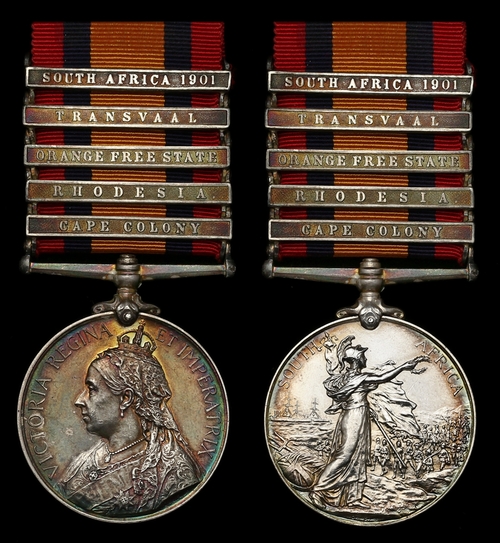
Auction: 25003 - Orders, Decorations and Medals
Lot: 33
The Queen's South Africa Medal awarded to Lieutenant A. R. J. Dewar, 5th New Zealand Contingent, who participated in the ill-fated Jameson Raid
An inveterate adventurer, Dewar's life saw him attend Cambridge University, join the Army as a Private and participate in the famous raid
He was later to join the New Zealand Contingent, serve through the Anglo-Boer War before moving to join the Straits Settlement Police and become a Planter in British Guiana
Queen's South Africa 1899-1902, 5 clasps, Cape Colony, Rhodesia, Orange Free State, Transvaal, South Africa 1901 (Lt. & Adjt. A. R. J. Dewar. N.Zea:Cont:), light contact mark, very fine
Arthur Robert Johnstone Dewar was born at Hydrabad, Bombay on 11 October 1869, the son of Caroline and Colonel James Dewar, Royal Artillery. The family returned to Britain from India in 1870 with Dewar's sister being born in the Bay of Biscay.
Educated in a small school at 11 Warwick Terrace, St. Leonards-on-Sea, Hastings he attended Queen's College, Cambridge before somewhat unusually attesting for the Gordon Highlanders as a Private on 27 September 1889. Seeing Home service for 5 years, Dewar was discharged on 11 March 1895 and settled on the Isle of Wight.
At some stage he travelled to South Africa where he was to become one of the ill-fated Jameson Raiders, served as Corporal listing his address as 1 St Georges Terrace, Ryde Isle of Wight. Jameson hoped for a 3-day dash to Johannesburg, before the Boer commandos could mobilise. To cover his tracks, he ordered all telegraph wires to be cut. Unfortunately, the telegraph wires to the Boer capital of Pretoria remained intact, enabling the Boers to track Jameson's movements from the moment he crossed the border. The Raiders were fired upon by a Boer outpost at 6 a.m. on 1 January. Six hours later, having advanced twenty miles, they fought a sharp skirmish with Boer marksmen in entrenched positions at Krugersdorp. They withdrew south-east in an attempt to outflank the Boers but were confronted by a far larger force waiting for them at Doornkop. After an initial firefight in which thirty Raiders were killed, Jameson saw the hopelessness of his situation and surrendered. His entire column was imprisoned by the Boers at Pretoria, with international repercussions. The German Kaiser, sympathetic to the Boer cause, sent a telegram to Paul Kruger congratulating him on his success.
It is likely that Dewar was imprisoned and transported back to Britain in the wake of the raid however he was back before long, serving as Lieutenant and Adjutant with the 5th New Zealand Contingent. The unit saw action for the first time near Ottoshoop where they did good work in the face of multiple casualties. Colonel Ketwich, formerly of the Loyal North Lancashire Regiment gave an opinion of the unit's service during the war stating:
'I saw a good deal of the 6th Imperial Bushmen and the 4th and 5th New Zealanders, and these were all good fighting men who knew their job well'.
Dewar served until 5 November 1902 when a note on the role states he returned to Britain. Joining the 5th (Militia) Battalion, Royal Warwick Regiment as 2nd Lieutenant on 29 August 1903. He transferred to the Staits Settlement Police the next year as Lieutenant on 25 November 1904, being advanced Captain on 19 May 1906. Interestingly Dewar was listed in the Gazette of British Guiana as a Planter on 19 October 1912.
An A. R. J. Dewar served as a Veterinary Officer with New Zealand forces with the rank of Lieutenant from in October 1916 - October 1918. He does not appear to have qualified for any campaign awards, Dewar died at Malling, Kent on 3 January 1936.
Subject to 20% VAT on Buyer’s Premium. For more information please view Terms and Conditions for Buyers.
Sold for
£1,300
Starting price
£800




